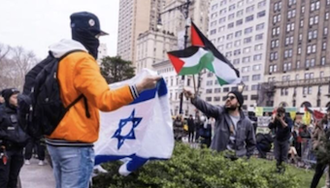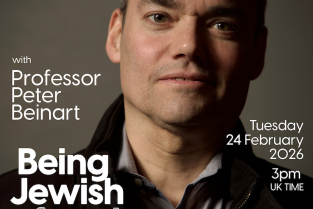Christian Zionism is not Christian

Pro-Palestine vs pro-Israel demonstrators, New York 23.12.23 (Shutterstock Image by Syndi Pilar)
Source: Jesuit Institute South Africa
When Israel closed the borders to aid in March, humanitarian organisations warned of an impending human-made famine in Gaza. Five months later, the images of skeletal and listless children are heartbreaking. I look at those images and think that in different circumstances, this could be my child.
Even if I can't do anything, I need to see. Irrespective of how upsetting it is to look into the eyes of those desperate mothers, I am moved to prayer, to ask for the miracle of mercy.
Compassion is the only Christian response.
It disheartens and angers me when I speak with some Christians who seem incapable of empathy in the face of such horror. One of the common threads in these conversations is that many Christians cannot or will not say that Israel has exceeded the parameters of just warfare. They argue that Christians should side with Israel, and failure to do so is antisemitism (stemming from the world's collective guilt for having allowed the Holocaust to happen). Therefore, they say, Israel must be allowed to do anything to defend itself.
This pro-Zionist narrative that condones Israel's purported right to unrestrained warfare is underpinned by a religious, albeit distorted, reading of biblical texts. It asserts that Israel is the Promised Land of the Torah and the Old Testament, which God gave to the Israelites for perpetuity. The complete restoration of this territory is intertwined with the religious hope of the coming of the Messiah.
Christian Zionism has bought into the claim that political dominance of the "Bible Lands" is not a human war for power and control of territory, but a divine battle, which is directly against Jesus' teaching. He repeatedly said that the Kingdom of God was not of this world (cf John 18:36). The eternal Jerusalem that we all hope to enjoy is not a physical place, but instead living fully in the presence of God for eternity.
The whole pro-Zionist argument is un-Christian. Jesus preached love, forgiveness, and non-violence, often to the ire of the nationalistic fervour of fringe groups like the Zealots and Sicarii (who wanted to overthrow Roman rule by armed resistance). Jesus emphasised love of God and neighbour as the highest value. He showed mercy on the poor and downtrodden.
In his Sermon on the Mount (cf Matt 5:17-20), Jesus affirmed that he did not come to abolish the Jewish Law, but to fulfil and perfect it. Thus, his teachings continually challenge us to widen the circle of who we include. For example, a legal scholar pressed Jesus for a narrow definition of "who is my neighbour?" (Lk 10:29). In response, Jesus told the parable of the Good Samaritan to show that neighbours include even those who were enemies of the Jews in Jesus' time. If we translate this into contemporary language, the starving Palestinians are our neighbours. Our Christian duty is to stand in solidarity with them. Joining the worldwide movement calling for an end to the deliberate food warfare in Gaza is our act of love and neighbourliness.
Political leaders have also exploited Christian fears to garner support for a conflict that, in any other context, would have Christians calling for an end to the genocide. However, the political argument reveals something far more insidious-deep-seated Islamophobia. The fear among some Christians is that if Judaism is stamped out, Christianity will be next. Many decent and otherwise generous Christians tell me that the war in Gaza is sad, but necessary. They tell me the suffering is Hamas', Iran's or Islamist extremists' fault. As such, Christians must stand with Israel to defend Christendom from the global takeover of Islam.
This is also an old and tired argument. The Christian Crusaders of the Middle Ages used the same racist justifications to pillage Jerusalem, in the name of defending Christ. Both Christianity and Islam survived. But the bloodshed committed in our name is one of the dark chapters in the history of Christianity, for which Pope John Paul II sought forgiveness in 2000.
Christians do not defend their faith through violence. Peace and love are our only clarion calls. Nor will Christianity be weakened by perceived external enemies, Muslim or otherwise. Sadly, we are more likely to lose Christians to sanctimonious judgment, bigotry, and lack of compassion than to religious martyrdom. If we act out of hatred and fear, people will turn away from us because we do not practice what we preach. If we are authentic in living as Jesus commanded us to, others will be drawn to Christianity by our fruits.
A Zionist philosophy has no place in Christianity. Let us live out the promise that Jesus makes in the beatitudes: "Blessed are the peacemakers: they shall be recognised as children of God (Matt 5:9), for that is how we will build the Kingdom of heaven, one stone at a time.
Follow The Jesuit Institute on Twitter @JesuitInstitute


















